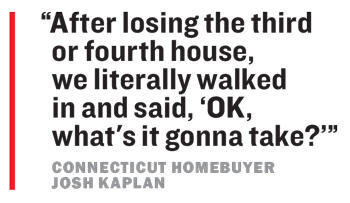 In April, a modest three-bedroom split-level hit the market in New Providence, New Jersey, about a one-hour NJ Transit ride from Manhattan. It was listed on a Friday at $699,000.
In April, a modest three-bedroom split-level hit the market in New Providence, New Jersey, about a one-hour NJ Transit ride from Manhattan. It was listed on a Friday at $699,000.
The property attracted 90 showings. By Sunday, there were 40 offers.
“We needed a flow chart to compare options and bids,” said Winifred Cavazini of Prominent Properties, the Sotheby’s affiliate that represented the seller.
The winning bid came in $100,000 over ask.
Even as New York City lurches toward a full-scale reopening, the real estate market in the surrounding suburbs remains ultra-competitive as agents say a continuous flow of city buyers puts a squeeze on the market.
With inventory at record lows, bidding wars have become a staple.
One buyer in Westchester lost out on six bidding wars before finding a home, Compass agent Linda Filby said.
“I’ve never had a client that lost that many houses,” she said. “I think I’ve never had a client who had more than two.”
Josh Kaplan and his family had been mulling over a potential move from Greenwich Village to Westport, Connecticut, since 2019, and the pandemic — as well as a second child on the way — forced their hand. They, too, were soon sucked into the chaos.
“After losing the third or fourth house, we literally walked in and said, ‘OK, what’s it gonna take?’” Kaplan said.
Agents and their clients have adjusted by moving fast to avoid pile-ons. Lauren Hurwitz, another Compass agent in Westchester, saw a dream home for one client hit the market on Good Friday, the start of an Easter weekend that would normally be quiet. Hurwitz’s clients were so eager to zero in before other offers, they saw the house on Friday morning and made an offer that was accepted on Saturday.
 In and around Essex County, New Jersey, Keller Williams agent Saritte Harel said her team has seen $2 million listings go for close to $2.5 million and just had a listing asking $825,000 go for $900,000.
In and around Essex County, New Jersey, Keller Williams agent Saritte Harel said her team has seen $2 million listings go for close to $2.5 million and just had a listing asking $825,000 go for $900,000.
“Our under contracts in April were up 100 percent from the year before, but active listings are down over 30 percent,” she said. “So that combination is just pushing into multiple offers.”
One listing in Westport that went for $2.2 million sits next door to an identical property (even down to the same decorator) that sold for $1.7 million in 2019, according to Compass agent Hyleri Katzenberg.
“February is typically when we start seeing new inventory,” said Susan Horowitz of West of Hudson Real Estate, a boutique firm based in Montclair, New Jersey. “Normally, we have these wonderful times where we get a big contribution of new sales… but we haven’t seen the traditional 24 new houses any given week.”
Heightened demand has pushed many suburban homeowners who previously were just curious about selling into listing right away.
“I tried to tell most clients, where do you see yourself in five years?” Katzenberg said. “If you don’t see yourself in this home in five years and you don’t absolutely need to live there now, you’re gonna kick yourself if you don’t act.”
Another client of Hurwitz’s who had been in Larchmont, New York, for five years, always had an eye on moving to nearby Rye. They decided now was their time to do it.
“They knew that the price that they could get on their less than 2,000-square-foot home in Larchmont was never going to be better than what they could get this year,” Hurwitz said. “And they were willing to pay a bit of a premium on the Rye home because the interest rate was so low.”
Agents say that even with the city’s offices increasing capacity, buyers are betting that some form of hybrid work is here to stay. Even buyers who expect to go back into the office by the fall anticipate a hybrid work schedule or retain a fear that the country may slide back into another lockdown. It’s no longer about finding a home with one home office; now it’s two.
With the search for space and a higher degree of tolerance for a long commute, the biggest surprise has been serious action in far-flung towns away from train lines.
“A lot of buyers are saying, you know what, I’m never going back to the city full time,” said Cindy Kief, a Corcoran agent based in Irvington, New York. “So I don’t have a need to live within 40 minutes of Manhattan, I can move further north.”
A self-proclaimed “apartment kid” who grew up in Philadelphia and spent her adult life in New York, Agatha Schultz said her family never anticipated moving to the suburbs. But the pandemic changed things, and she and her family recently moved into a three-bedroom house in Katonah.
“All our friends have left,” she said. “Everyone was either on their way out, or the pandemic gave them a push. I feel like everyone we know bought a house this year. It’s crazy.”
Compass agent Rick Distel described weekend showings as “manic” in Roxbury, Connecticut — another destination traditionally considered a bit out of reach for city commuters.
“You get 15 minutes to go in and look and there’s a line in the driveway for the next showings,” he said.
After observing a circus of an open house nearby, one couple approached Distel, curious as to how much their own house might fetch in the current market. Their four-bedroom, 3,100-square-foot home — which, crucially, did not have a pool — sold in one day for $100,000 over ask at $1.35 million.
Agents across the tri-state area predict that demand at the current rate might endure for another six months to a year before leveling out to a more stable environment. But many claim to sense a change in tastes that could become a permanent consequence of the pandemic.
“Before the shutdown, everybody was talking about the generation that wants to live smaller, and travel more and not make their house their big expense, or their big investment,” Kief said. Now, the demand is for all-inclusive homes with space to stretch and amenities like a pool and home theater.
“It’s come back with a vengeance,” she said.
